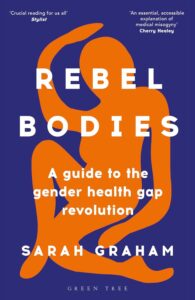
Rebel Bodies: A Guide to the Gender Health Gap Revolution
by Sarah Graham
Genres: Non-fictionPages: 288
Rating:

Synopsis:An inclusive and empowering manifesto for change in women's healthcare - exploring the systemic and deep rooted sexism within medicine, and offering actionable ways for women to advocate for ourselves and others and get the diagnosis and treatment we need.
Have you ever been to a doctor and felt like you were being fobbed off or ignored? Did they belittle or overlook your concerns about your health? Ever been told you're just 'hormonal'? You're not alone.
Women make up 51 per cent of the population and are the biggest users of healthcare services - for themselves and as mothers and carers. But all the research shows there are massive gender differences in men and women's healthcare. Our pain and suffering has been disbelieved; we are misdiagnosed and not trusted to make informed choices about our own bodies.
As women speak out about their experiences of gaslighting and misdiagnosis, health journalist Sarah Graham investigates what it will take to bridge the gender health gap. Meet the patients, doctors and campaigners who are standing up and fighting back, and find practical tips on advocating for your own health. Be inspired by stories that will incite and offer hope.
You're not alone, you're not going mad, and we believe you.
Sarah Graham’s Rebel Bodies is an inclusive discussion of the problems with gendered healthcare in the UK — not just the issues women face in receiving appropriate care, but also the issues for trans, non-binary and intersex people. In several instances she focuses on the specific issues for black women and people who don’t speak much English, as well, and includes the perspectives of a whole range of people.
It’s a really validating read if you’ve suffered similar — for example, like myself being treated with antidepressants for gallstones, and not being trusted to even manage my own asthma care (unlike most patients, my own experience of my asthma is routinely ignored, I am not permitted to have a peak flow meter to monitor how well my treatment is working, and I am not trusted to comply with my own medication) — and offers some resources and advice. If you’ve had cause to navigate the system already, there’s probably not a lot new here, but it’s still interesting and useful to be validated.
(It was a little less validating to read someone comparing endometriosis to asthma, suggesting that their asthma gets treated properly because it’s non-gendered, because that isn’t my experience. I recognise that they weren’t saying “female-bodied people never have trouble getting proper treatment for asthma”, but the comparison was still a little bitter.)
I’d say this is a good resource for people in the UK, but a lot of the discussion is very specific to the UK. There are absolutely parallels in other countries, and some of the ideas about self-advocacy are useful, but a lot of the problems discussed are reinforced (and sometimes created) by our health system, and as such isn’t applicable. I’d say it has much lower utility for people in other countries, which is worth bearing in mind.
Rating: 4/5 (“really liked it”)

Oh hey, snap: I was given antidepressants for tonsillitis o.O
calypte recently posted…The Thursday Murder Club (2025)
Oof…
This sounds interesting, I appreciate you letting us know that its focus is on British healthcare. Thanks for sharing your thoughts.
Shelleyrae @ Book’d Out recently posted…It’s Monday! Where Are You Reading? #SundayPost #SundaySalon
I think there’s definitely transferable advice, but yeah… some of it just isn’t relevant.